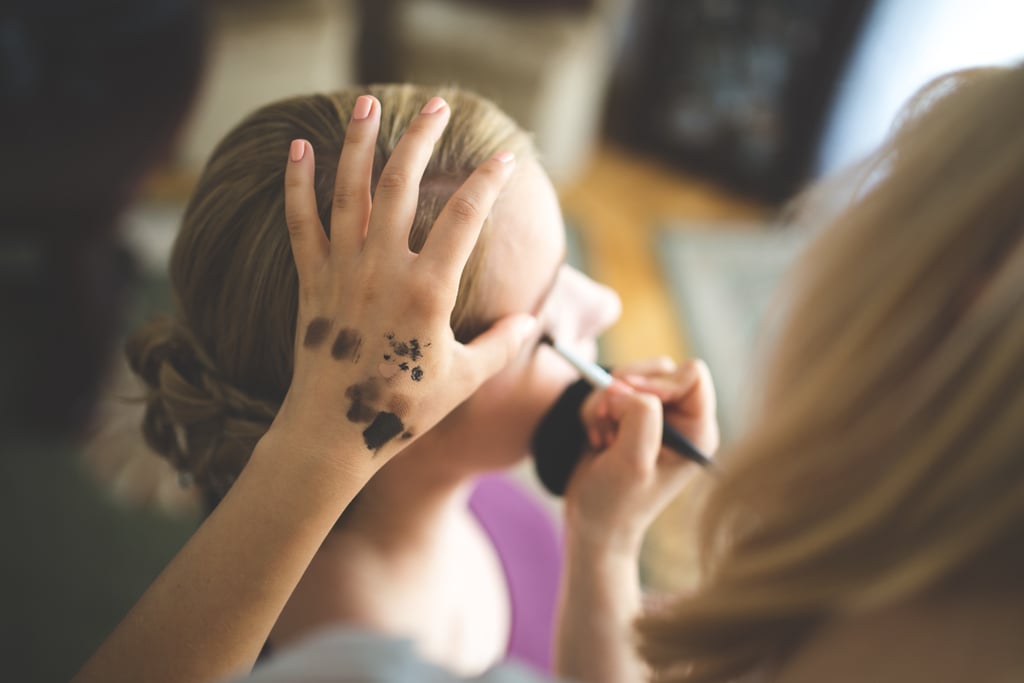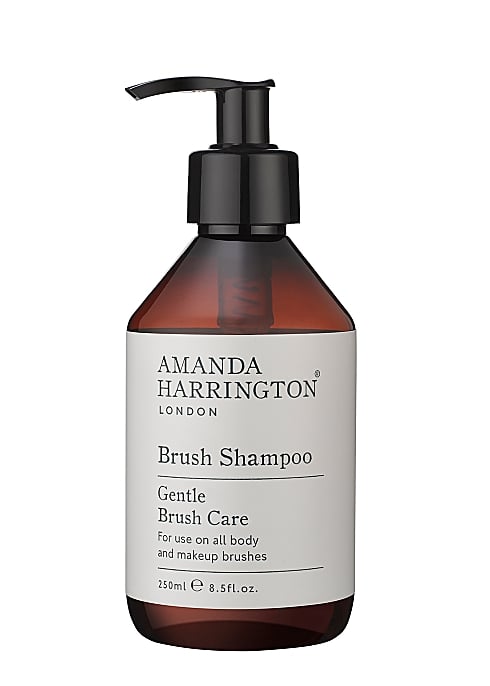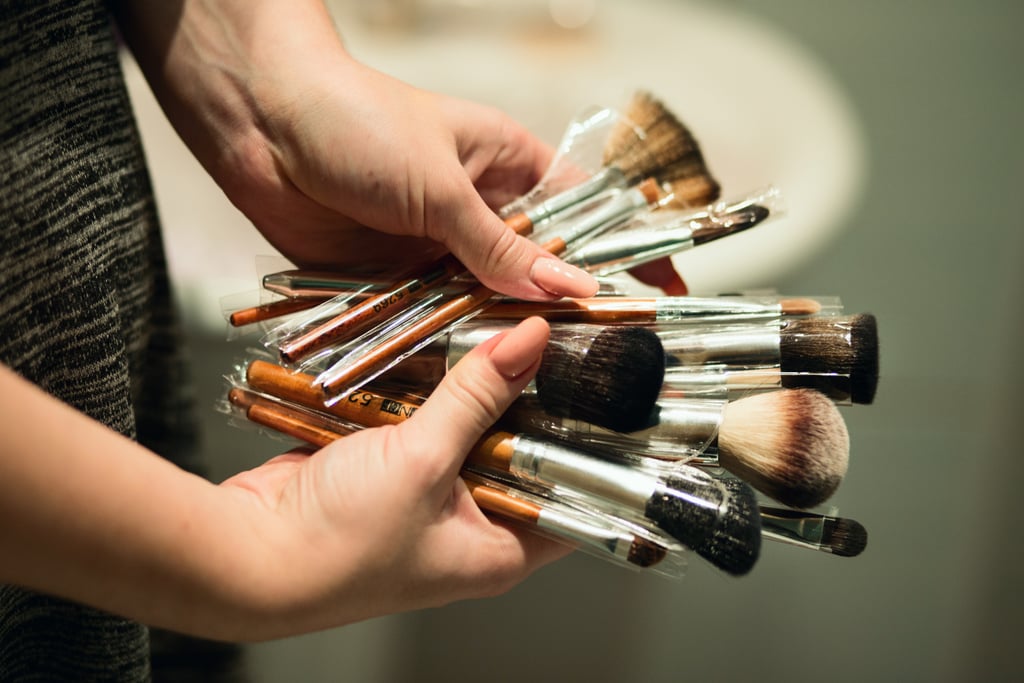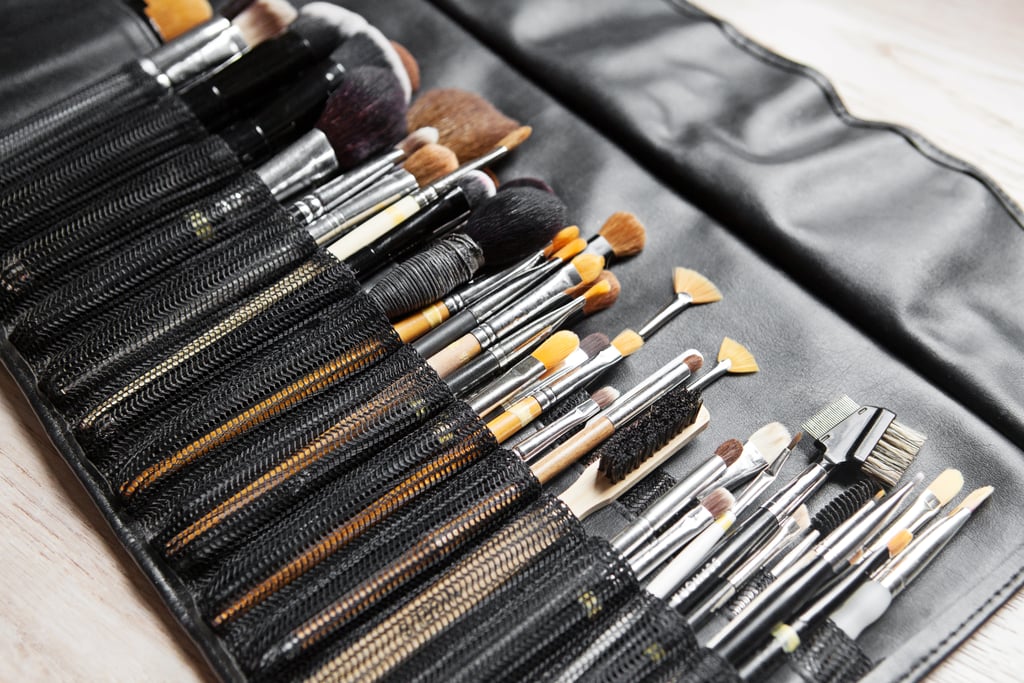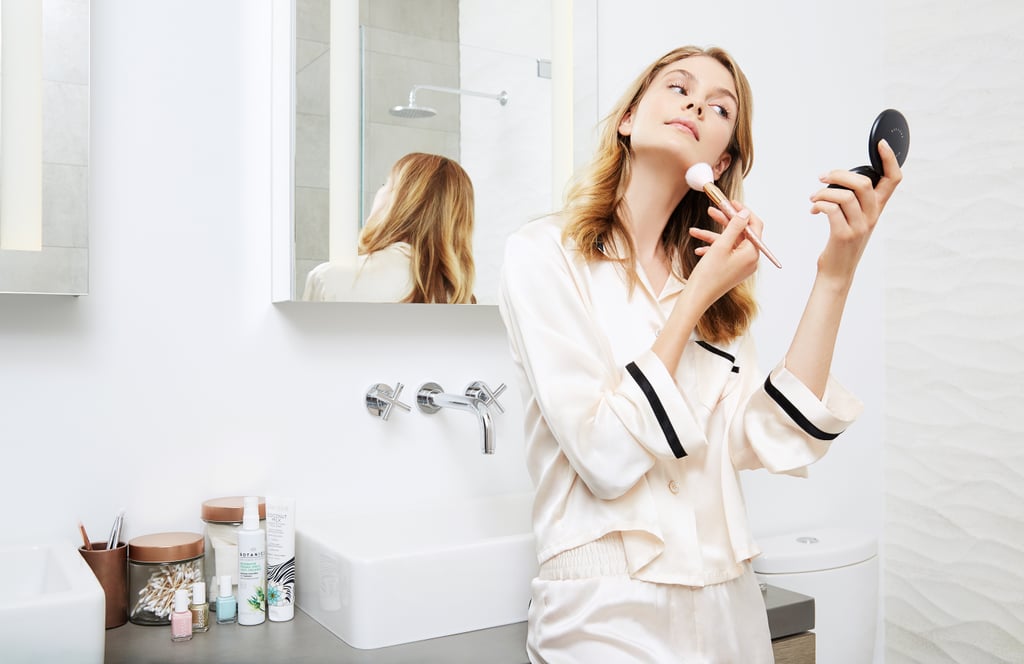When was the last time you cleaned your makeup brushes [1]? If your answer is not a few days ago, a week ago, or at a stretch the week before that, you need to keep reading, take notes, then go and clean your makeup brushes.
Keeping your makeup brushes clean (no matter how small) is one of the simplest ways to guarantee your tools are working as they should, as well as keeping your makeup looking fresh and ensuring that no unwanted dirt and bacteria are making their way onto your face. The easiest way to avoid pesky bacteria is to — you guessed it — wash your makeup brushes. But like a lot of beauty practices, there are certain dos and don'ts, plus some top tricks that can make it a much less tedious task. And who better to ask than professional makeup artists who have to wash their makeup brushes after every single use?
We quizzed two top London-based makeup artists, Hannah Martin [2] and Neil Young [3], on exactly how they clean their makeup brushes, including the exact materials they use every day and the supereasy drying techniques they swear by. Read on to get all the tips and tricks, then go forth and clean your brushes — you've got no excuse now with all this expert advice.
Why Clean Your Makeup Brushes?
"Dirty brushes can be a breeding ground for bugs including fungi, bacteria and viruses, which can result in unwanted breakouts and skin infections," says Rishika Sinha [4], consultant dermatologist at The Private Clinic [5]. Or — if you're a makeup artist and using the same brush from client to client — risk passing other skin conditions from person to person. Conditions "such as staphyloccus aureus (a common bacteria found on the skin), can cause skin infections if they are given the right opportunity, such as dry, cracked skin, or eczema — any skin condition where the barrier is compromised," she explained.
"Cream-based products in synthetic fibres makes for the perfect breeding ground for bacteria," Martin said. Using these over time can lead to the product accumulating in the bristles and the ferrule (the metal part holding the bristles and the handle together), making it hard to remove.
But it's not just avoiding the spread and growth of bacteria; cleaning your brushes also keeps them working as well as they did right out of the box. The cumulative buildup of product can affect the way the formula is applied and subsequently how it sits on the skin. The same goes for eyeliner: you're unlikely to get a sharp, pristine cat eye with leftover, dried formula caked on and in the bristles.
What Do You Wash Your Makeup Brushes With?
What to wash makeup brushes with is more down to personal preference than being incorrect. In the past few years, there have been more cleaning gadgets — silicone cleansing pads, high-powered machines — introduced to the market than actual brushes. OK, maybe not quite, but there are more and more gizmos (such as the StylPro cleaner and dryer [6]) that've launched to help make cleaning as quick and effective as possible for all makeup enthusiasts.
But one of the best products to wash your brushes with might be sitting right on your kitchen sink. "I use dishwashing soap, like Fairy liquid, for my face and eye brushes," Young said. "Think about it; Fairy liquid is meant to be gentle on hands and cut through grease. Your brushes pick up natural skin emollients so you need something to cut through that quickly." And the speed at which something cleans your brushes is just as important. "Cutting through the grease quickly ensures that you're not overcleaning, which can damage the bristles over time." For things like eyeliner and lip tools, Young sometimes prefers a simple bar of soap. His top tip is to look out for hotel soaps that often have an uneven texture to them; this creates the ideal surface to break the buildup of product and dissolve it quickly.
Martin also uses various products to maintain a pristine brush collection. To wash away eyeliner, she uses a cream face cleanser, which is perfect if your skin is sensitive to various products. For a deep clean, she loves to use the Amanda Harrington Gentle Care Brush Shampoo [7] (£14) — but also notes a mild shampoo works well — paired with a Beautyblender Keep.It.Clean Rubber Mitt [8] (£17) to get right into the root of the bristles.
In between clients, and on set when Martin and Young don't have time for big cleans in between models, they both turn to makeup brush cleaning sprays. Young prefers to use the MAC Brush Cleaner [9] (£12.50) because "it doesn't leave the bristles soaking wet, making it a great option to clean in between [makeup looks on set] to remove the superficial product." Martin uses Cinema Secrets Brush Cleaning Spray [10] (£11) and a kitchen towel, which doesn't require rinsing.
How Do You Wash Your Makeup Brushes, Exactly?
So, you know why you should be washing your brushes and you know what to wash them with, but how exactly do you wash them?
"Rinse your brush head under warm water, squeeze a little product into the palm of your hand, swirl the brush head in the product, and use your fingers to tease at the base of the brush to make sure it's cleansed thoroughly, then rinse in warm water," Martin explained. For the ones that might need a little more attention, she suggests using a rubber mitt or a block of soap to help break down the buildup. Continue this process until the water coming from the bristles runs clear.
Once finished with the actual cleaning part, Young likes to "run the brush under a tepid tap, squeeze out all of the water, and remould the brush with my fingers before setting it to dry."
How Do You Dry Your Makeup Brushes?
Unfortunately, the work doesn't stop at just washing. Drying your makeup brushes properly is also an incredibly important step. The main reason being that you want to avoid water getting trapped between the bristles and the ferrule, which can both break down the glue holding the bristles and ferrule in place and cause mould to grow.
Both Martin and Young take a similar approach to drying their brushes. Young leaves them hanging over the edge of the sink so the bristles dry and excess water drips into the sink, avoiding water sitting in the ferrule, which might lead to a damp smell. Martin also leaves her set on a flat surface to dry fully, often overnight, as she says "there's nothing worse than having to pack damp brushes, which then risk losing their shape."
Although there are pretty standard ways to dry brushes, some people have taken some extremely creative measures to ensure their kit is dry and undamaged. On Facebook recently, I saw a person use a swimming pool noodle [11] to create perfectly sized holes to hang their brushes from upside down. Committed to the cause is an understatement.
How Often Should You Wash Your Makeup Brushes?
How often you clean your brushes depends on a few things, including how often you use them, what products you're using, and whether you're a professional makeup artist. If you don't use brushes on paying clients every day, daily cleaning isn't essential, although if you're using a Beautyblender, dampening every day with water is necessary.
"I wash my brushes every day, the whole set," Young said. "Every night after work, they get a good shampoo." If you're just using your kit on yourself, however, Young admits that a daily deep clean probably isn't necessary, although he recommends spraying them down with brush cleaner after every use too. As for a deep clean? "I'd recommend washing all of your brushes every seven days to get rid of any excess oils. Most now have antibacterial fibres in them, but you do still need to clean them."
Martin also washes the kit she uses on clients every day but added that for regular use, "all brushes should get a deep clean at least once a month."
